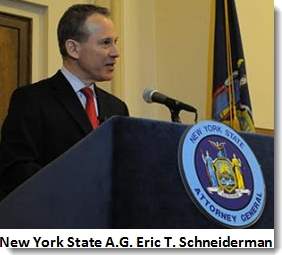About time! New York Charges JPMorgan with Mortgage Fraud
By Michael Collins
The big banks and Wall Street have escaped unpunished for causing the financial crisis. Now, New York Attorney General Eric Sneiderman is charging JPMorgan with mortgage fraud. It is a bold move and strong start on the path to justice.
(New York Times, Oct 1) “The federal mortgage task force that was formed in January by the Justice Department filed its first complaint against a big bank on Monday, citing a broad pattern of misconduct in the packaging and sale of mortgage securities during the housing boom. The civil suit against Bear Stearns & Company, now a unit of JPMorgan Chase, was brought in New York State court by Eric T. Schneiderman, the state attorney general.”
Schneiderman charged Bear Sterns and JPMorgan, which acquired Bear, with fraud under the state’s Martin Act. Unique to New York, the act allows prosecutors the ability to vigorously pursue financial fraud with both civil and criminal charges. The investigative powers provided are broader than those found in any state or among regulators (e.g., the Securities and Exchange Commission).
EMC Mortgage, Bear’s lending unit, “made material misrepresentations about the quality of the loans in the securities ” and ignored evidence of broad defects among the loans that they pooled and sold to investors.” EMC identified bad loans then demanded and received payments from originating lenders (firms they’d purchased the loans from). According to the indictment, the deception and fraud came when EMC failed to share any of the recovered fund with investors.
“Defendants systematically failed to fully evaluate the loans, largely ignored the defects that their limited review did uncover, and kept investors in the dark about both the inadequacy of their review procedures and the defects in the underlying loans.” Eric T. Schneiderman, Attorney General, New York, October 1
The New York Times described this indictment is a shift away from specific cases of fraud to indictment for a general pattern of fraud on the part of big finance. Given the man behind the charges, this spells trouble for the big banks and Wall Street.

